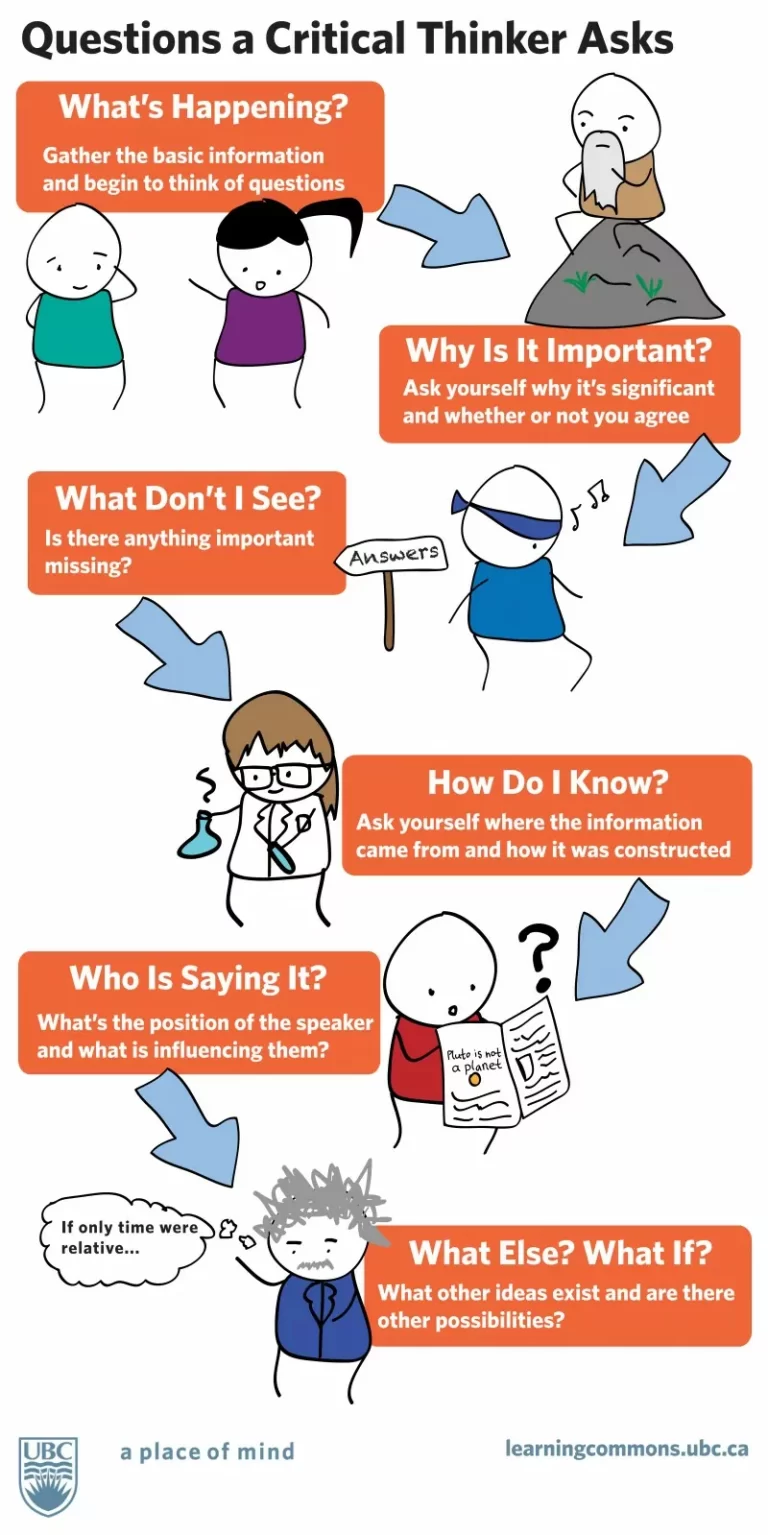1. Practice critical thinking and reading
To prepare for freshman year in college, the first thing to keep in mind is that coursework in college will be significantly more complex than in high school in order for students to keep good grades. College readings can be substantially more theoretical and lengthy, and you are expected to do them prior to class discussions. The best way to practice these skills is to read complex academic materials as much as possible. A good way to start is to search for college-assigned summer readings. Every year, colleges publish summer readings for incoming students to read for leisure, and potentially inspire conversations with other students. If you don’t want to find a book of your own, you can check out selections from colleges all across the country!
In addition to critical reading, we ask students to practice critical thinking skills. Critical thinking is a reflective style that requires layers of objective reasoning in order to decide what to believe or do. Everyone naturally thinks, but developing critical thinking skills across subjects, topics, environments, opportunities, etc., takes intensive practice. Critical thinking teaches students to challenge reasoning, question the author’s intentions or purposes, consider new perspectives, and examine bias while reading. College courses encourage this kind of active learning because it helps students absorb and understand knowledge better than through passive learning. High school students are often introduced to the concept of critical thinking, but may not know how to put it into practice.
We invite you to choose one interesting reading to practice critical thinking for this exercise. While reading, ask yourself these questions (Credit: University of British Columbia):
- What’s Happening? – Gather essential information about the background and content of the book.
- Why is it important? – Ask yourself why the content/topic is meaningful, and whether you agree or disagree.
- What don’t I see? – Are there any important pieces of information or perspectives I think are missing?
- How do I know? – Ask yourself where the information is coming from, whether that source is reliable, and how it was constructed.
- Who is saying it? – What’s the speaker’s position, and what is influencing them?
- What else? What if? – Are there any other possibilities, and what other ideas or viewpoints exist?
2. Polish soft skills
Colleges and universities will present you with the unique opportunity to be part of a very diverse community with people from different backgrounds with a vast array of different beliefs and perspectives. Therefore, high school students must learn strong communication skills for collaborating in group projects, presenting ideas coherently, communicating with professors, and much more. Strong communication skills are a very desirable trait that can easily boost a student’s chances for success while pitching ideas, interviewing, and presenting research.
In addition, students should focus on improving their time management and organizational skills to prepare for freshman year. Unlike high school, college students have to be independent and know how to appropriately prioritize tasks and manage their time. High school teachers keep students on track and schedule their daily activities. College life, on the other hand, varies depending on school activities, internships, and other responsibilities; thus, we suggest practicing time management and organizational skills during high school to learn skills for optimizing time and dealing with multiple responsibilities You can start practicing now by planning out your day and your week: studying, running errands, taking time to relax, etc., anything from the highest priority to the lowest. After planning your day, consider what available time slots you have to see if you can add other enriching activities that you want to do, but can’t find the right time for. There are many applications and platforms that help with time management and organization, so find the one that works best for you!
3. Get to know your professors
In college, it is extremely beneficial to get to know your different professors. If you take four classes per semester, you have the possibility of meeting up to 24 new professors. However, once you decide on a major, you will take various classes with the same professors in that department. We suggest high school students practice nurturing strong relationships with professors because they may contribute significantly to your success; such as helping you find appropriate resources, writing recommendation letters, etc. Additionally, once students select their college classes leading up to their first year, they should email professors to introduce themselves and ask any preliminary questions, using the communications skills gained from high school.
4. Don’t ignore orientation activities
Before the first week of college, students have the chance to participate in different activities during Orientation Week. Orientation is an excellent way for students to get to know each other and become familiar with school resources. By participating in Orientation, students will have a great time learning about the college and make lifelong friends that will stick by them for the rest of their college years and beyond. By learning in advance about school resources, students can also take advantage of everything they have to offer. Taking the time to learn about your school’s orientation program before they start will give you the opportunity to plan for the events and prioritize the most useful ones.
5. Stay healthy to prepare for freshman year in college
The “Freshman 15” is a classic term that has been spreading amongst freshmen who live in dorm rooms and have dining halls. With the availability of various food options for college students and the transition to a new environment, many students do not maintain a balanced diet, leading to an increase of 15 pounds. Additionally, both the added stress and freedom of college life can often lead to an irregular sleep schedule, or very little time for relaxation and self-care. Staying healthy is extremely important since it allows you enough energy to start your day fresh and be productive if you get enough sleep and eat properly.
Here are some tips for how freshmen can stay healthy when they start college:
- Exercise regularly: Regular exercise can help students maintain a healthy weight and reduce stress. Aim for at least 30 minutes of moderate-intensity exercise most days of the week, such as brisk walking, jogging, or cycling. Take advantage of your campus gym and other recreational facilities. They often have a large variety of work-out equipment, sports equipment, and even classes or sports teams!
- Eat a variety of fruits, vegetables, whole grains, lean proteins, and healthy fats and avoid too many processed foods or fast food to keep yourself focused and healthy. Use the wide variety of foods offered by dining halls to explore new healthy foods that you might enjoy.
- Manage stress: College can be a stressful time, but too much stress can lead to overeating and weight gain or loss. Find healthy ways to manage stress, such as exercise, meditation, or talking to a friend or counselor.
- Be kind to yourself! Your body and habits will inevitably change with new environments and responsibilities; so don’t feel upset with yourself for these changes. Your main goal should always be to feel confident and healthy for you, not based on the expectations of others.
6. Learn to make time for yourself, your well-being, and your hobbies
College can be one of the most hectic times, with many obligations and opportunities that will keep you very busy. Sometimes, students can feel burned out or too tired to keep up with all of their academic work, extracurricular activities, socializing, and professional work. Therefore, it’s important to practice self-care, prioritizing their health, and taking time for their personal hobbies and passions during high school so that you will continue those good habits going into college. Students must find time for themselves and learn to say “no” when appropriate. Use your free time wisely, and don’t force yourself to be busy all the time. Having time for yourself and investing in activities that you enjoy will help you recharge and give your best in everything you do.
7. Learn to budget and understand your finances
Tuition can be an overwhelming expense for college students, especially when taking out loans to fund their college education. Before arriving at school, you should spend the summer searching for financial aid and scholarships or part-time jobs to help pay for college. To learn more about financial aid and scholarships, please check out the article “Differences Between Financial Aid and Scholarships.”
Throughout college, your state, school, and specific departments will offer additional scholarships depending on your extracurricular involvement and academic performance. Most colleges have sections on their website dedicated specifically to scholarship opportunities and applications, so make sure to check that out once you’ve been accepted to your university! It can also be helpful to do research on competitions and scholarships offered by non-profits and other organizations that give money to qualified students who compete or apply.
In addition to seeking financial aid and scholarships, you should also be aware of your personal finances. Students should learn about personal finance starting in high school because, during college, you will have to be responsible for your own budget, including big spending like tuition and loans. We published an article discussing personal finance for high school students that you should check out! The article highlights different areas of finance you should pay attention to. Overall, your time during college will be much less overwhelming if you go in with at least some knowledge about managing money and the options that are available to you.
For high school students, when it comes to preparing for your freshman year, it’s crucial to prepare your college application carefully, so you can choose a school that you want to attend and will make impactful changes for the future.
Following these tips can help you get the most out of your college experience. Applying these skills will allow you to take the time to enjoy your college years, as they’re a special time that you’ll only experience once in a lifetime. Make sure to make the most of it and create lifelong memories!











